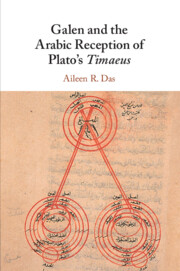Book contents
- Galen and the Arabic Reception of Plato’s Timaeus
- Galen and the Arabic Reception of Plato’s Timaeus
- Copyright page
- Dedication
- Contents
- List of Figures
- Acknowledgements
- Notes on Texts, Translations, and Transliterations
- Abbreviations
- Introduction: Plato’s Timaeus as Universal Text
- Chapter 1 Galen and the ‘Medical’ Timaeus
- Chapter 2 From the Heavens to the Body: Ḥunayn’s Ophthalmology
- Chapter 3 Al-Rāzī: The ‘Arab Galen’ and his Plato, New Disciplinary Ideals
- Chapter 4 Laying Down the Law: Avicenna and his Medical Project
- Chapter 5 Uprooting the Timaeus: Maimonides and the Re-medicalization of Galenism
- Conclusion: Medicine Disciplined
- References
- Index Locorum
- General Index
Chapter 2 - From the Heavens to the Body: Ḥunayn’s Ophthalmology
Published online by Cambridge University Press: 30 October 2020
- Galen and the Arabic Reception of Plato’s Timaeus
- Galen and the Arabic Reception of Plato’s Timaeus
- Copyright page
- Dedication
- Contents
- List of Figures
- Acknowledgements
- Notes on Texts, Translations, and Transliterations
- Abbreviations
- Introduction: Plato’s Timaeus as Universal Text
- Chapter 1 Galen and the ‘Medical’ Timaeus
- Chapter 2 From the Heavens to the Body: Ḥunayn’s Ophthalmology
- Chapter 3 Al-Rāzī: The ‘Arab Galen’ and his Plato, New Disciplinary Ideals
- Chapter 4 Laying Down the Law: Avicenna and his Medical Project
- Chapter 5 Uprooting the Timaeus: Maimonides and the Re-medicalization of Galenism
- Conclusion: Medicine Disciplined
- References
- Index Locorum
- General Index
Summary
The second chapter studies the efforts of the Christian Ḥunayn ibn Isḥāq, whose workshop in ʿAbbāsid Baghdad translated the Galenic sources considered in this book, to enhance the respectability of the specialism of ophthalmology in his Ten Treatises on the Eye. I show that, even more so than medicine, ophthalmology was at a disadvantage in its pursuit for epistemic authority because Galen himself had attacked the sub-field as an exemplar of the worrying tendency among doctors in Rome and other cities towards specialization, which threatened the unity of the discipline and the health of patients. Concerned with his own intellectual status at court, Ḥunayn, I argue, subversively uses Galen's explanation of the Timaeus' description of the eyes' service to the rational soul to give ophthalmologists a stake in medico-philosophical controversies relating to sensation. I also expose how Ḥunayn modifies Galen’s interpretation of Plato’s teleological ocular anatomy and visual theory in order to privilege the eye over all other organs as a window to cosmic knowledge.
- Type
- Chapter
- Information
- Galen and the Arabic Reception of Plato's Timaeus , pp. 69 - 103Publisher: Cambridge University PressPrint publication year: 2020

